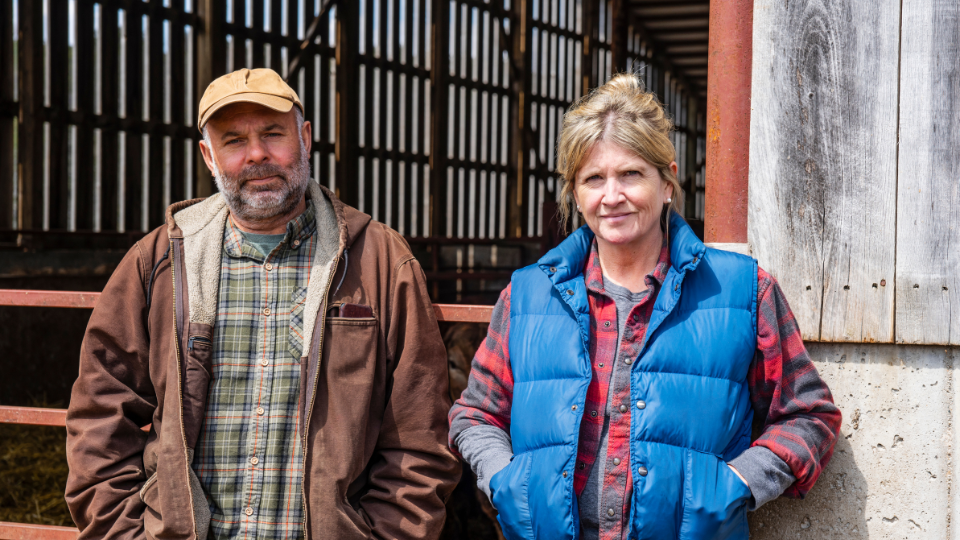Reducing Stress in Relationships: Check in, Don't Check Out

While many people run agricultural productions alone, for many, agriculture brings together multiple family members. This brings many benefits including shared time together working for something you all care about and providing for your community. On the other hand, this “together time” can mean that there is heavy overlap between work stress and family stress. When one or both partners are stressed about work, it can easily spill over into the relationship, and family stress can spill into your work life (Patterson, 2002). In this post, we’ll present relevant research on simple practices that will help you navigate stress in your relationships.
When you or your family member are stressed out, how does this show up in your relationship? Maybe one of you deals with work stress by working; maybe you both disengage at the end of the day and use substances or media to try to chill out. Strategies such as these can drain your relationship of vitality (Harris, 2009), potentially leading to divorce or separation for domestic partners. At the more immediate level, they also result in you facing the challenges of life alone, even though your family members may be willing and able to support you.
Rather than allowing life stressors to negatively impact your relationship, researchers have identified several ways you can respond to stress that lead to stronger relationships. At the most basic level, this involves getting on the same page about the stressor and openly communicating about how it is affecting each of you and how you want to address it (Bodenmann et al., 2016). When people are able to do this, they report better individual coping, higher life satisfaction, higher relationship satisfaction, commitment, and stability, and better physical and mental health (Falconier & Kuhn, 2019).
What Works: The Stress-Reducing Conversation
John Gottman, a psychologist-researcher who has spent decades studying couples, has proposed stress-reducing conversations as a way for partners to unite as a team in tackling a stressor that is outside of the relationship, such as working in agricultural businesses. His ideas similarly apply for other types of relationships. In the stress-reducing conversation, both people take turns speaking or listening as they discuss something causing them stress in each of their lives. Then, they switch roles. It is important that the stress discussed is something outside of the relationship, not something the other person is doing/should do/shouldn’t do. The person who is speaking discusses their stress in as much detail as is necessary and tries to be open about why it is stressful and how it is impacting them. The person who is listening tries to really understand the other’s experience and asks questions that communicate support and understanding.
Here are potential statements that each person could use to unite as a team in tackling life challenges:
| Speaker | Listener |
| I am really stressed about our farm. | What do you think is contributing to your stress? |
| I don’t know if I can keep this up. | It sounds like this is really challenging for you. |
| I just feel completely overwhelmed. | Come here and sit by me. We’re going to be okay. |
| I am totally frustrated with that seller. He really ripped me off. | That guy totally mistreated you! I’d be frustrated, too. |
| I feel like I have to manage the ranch all alone. | This is our problem, and we can handle it together. |
What Gets in the Way
While this makes sense in theory, it can be hard to put it into practice with your partner. One of the reasons for this is that when our partner is stressed, we become stressed too. This stress can cause us to act respond in a way we are not proud of, like attacking or running away from our partner (Harris, 2009). Our mind may tell us negative stories about ourselves or our partner, like “I’m right, and they’re wrong” or “They’re just a bad partner/person.” When we get wrapped up in these stories, it becomes a lot harder to treat our partner in the kind, caring, supportive manner we would like to. If you feel like this is something that happens to you, read our posts on unhooking [insert link to unhooking post], cultivating acceptance [insert link to acceptance post], and values [insert link to values post] to understand how to respond differently.
Practice
John Gottman’s research suggests that putting in the effort to have a stress-reducing conversation can pay big dividends, both in the short-term and the long-run. Why don’t you give it a try – explain the idea to your partner or family member, or have them read this article, and then open up to each other about a part of your stress. If you want more information on the stress-reducing conversation, you can access the Gottman blog.
Conclusion
We all get stressed, and unfortunately, one of the first things stress impacts is our closest relationships. By intentionally talking with our family members about our stress and opening up about how it is affecting us, we gain space from the stress and are able to respond more effectively. This small choice can help you unite as a team, rather than letting stress divide you.
References
- Bodenmann, G., Randall, A. K., and Falconier, M. K. (2016). Coping in couples: The systemic transactional model (STM), in M. K. Falconier, A. K., Randall, and G. Bodenmann (Eds.), Couples Coping With Stress: A Cross-Cultural Perspective, (5-22), Routledge.
- Falconier, M. K., & Kuhn, R. (2019). Dyadic coping in couples: A conceptual integration and a review of the empirical literature. Frontiers in Psychology, 10. https://www.frontiersin.org/article/10.3389/fpsyg.2019.00571
- Gottman, J. M., & Gottman, J. S. (2014). Level 2 clinical training: Gottman method couples therapy—Assessment, intervention, and co-morbidities. The Gottman Institute, Inc.
- Harris, R. (2009). ACT with love: Stop struggling, reconcile differences, and strengthen your relationship with acceptance and commitment therapy. New Harbinger.
- Patterson, J. M. (2002). Integrating family resilience and family stress theory. Journal of Marriage and Family, 64(2), 349–360. https://doi.org/10.1111/j.1741-3737.2002.00349.x
Related Research














